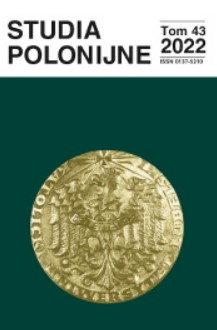SOCIAL TIES IN POLISH FAMILIES IN IRELAND: A COMPARATIVE ANALYSIS BASED ON OWN RESEARCH IN THE LAST DECADE
SOCIAL TIES IN POLISH FAMILIES IN IRELAND: A COMPARATIVE ANALYSIS BASED ON OWN RESEARCH IN THE LAST DECADE
Author(s): Mateusz SzastSubject(s): Family and social welfare, Migration Studies, Ethnic Minorities Studies
Published by: Towarzystwo Naukowe KUL & Katolicki Uniwersytet Lubelski Jana Pawła II
Keywords: family; migrations; social ties;
Summary/Abstract: This article focuses on the concept of social ties in Polish families living in Ireland. It is not sufficiently represented in research work on economic emigration, especially post-accession emigration to Ireland, considering the context of the functioning of a modern migrant in their interpersonal space. It is important that the life of modern man is shaped by lots of interpersonal interactions in the social space, too. Yet, more important are interactions in the families from which the migrants come, in which they function or with whom they want to function. After opening the labor market to citizens of the new EU member states in 2004, Ireland hired the largest number of workers from the EU-8 countries. This approach was defined and analyzed on the basis of the group of respondents who were post-accession migrants in Ireland (N 461) in the research survey conducted in July and August of 2015 in Ireland and based on the 2016 and 2019 qualitative surveys on families in Ireland. Three research projects were analyzed. Therefore, the main subject of the article is to draw the reader’s attention to the issues of interpersonal relations and the importance of the family in the minds of the respondents, who were migrants. The research contains interesting, from the point of view of a sociologist, information on the preferences of Polish migrants in the field of shaping family relationships, the strength of family ties and the social roles performed based on these. The collected data show that there is a change in the functioning of the modern family, especially in the context of its functions, the roles of family members as well as openness to its alternative forms, but these changes are not significant enough to speak of a transformation of the nuclear family.
Journal: Studia Polonijne
- Issue Year: 2022
- Issue No: 43
- Page Range: 381-403
- Page Count: 23
- Language: English

